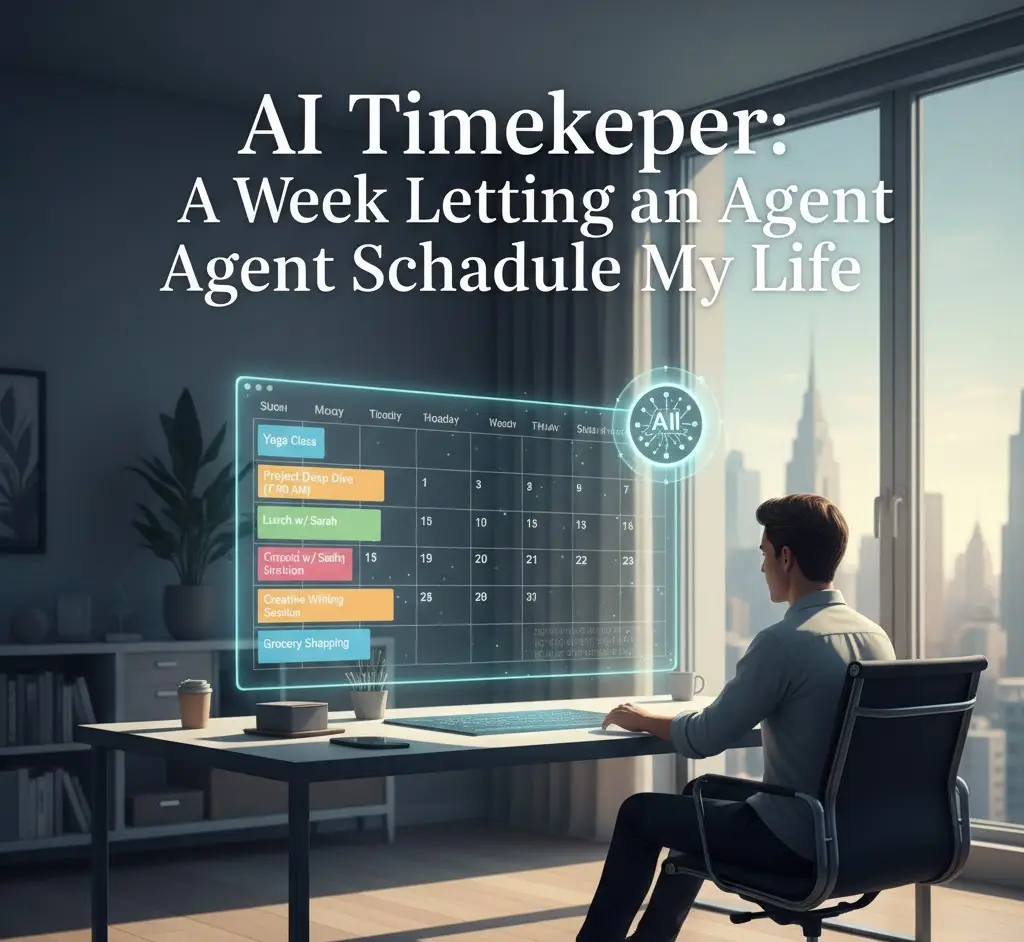In today’s fast-paced world, time has become more important than ever. We work, attend meetings, respond to emails, and meet deadlines. The latest trend accompanying artificial intelligence? Using AI in managing time. What if, instead of planning your week yourself, you let the AI agent do all the work? I decided to try out this experiment for a week. My challenge was simple-to let an AI agent take control of my schedule for seven days and see how it impacts my productivity, stress levels, and overall satisfaction. Here’s how it went.
Day 1: Handing Over Control
Day one was meant to get me acquainted with the AI timekeeper. I used an AI-powered scheduling assistant that allows integration with my calendars, emails, and personal preferences. I started by feeding it some basic information: important tasks, preferred working hours, personal commitments, and a few long-term goals. The AI was quick to analyze my inputs and suggest a detailed schedule for the week.
I was both excited and a little skeptical: would I be able to trust an AI with my time? Would it understand the nuances of my daily life, or would it over-simplify everything? The AI started to block out periods for work, rest, meals, exercise, and even relaxation. It seemed efficient, but I was nervous about losing control over my day.
Day 2: Efficiency versus Flexibility
It worked tirelessly to optimize my schedule. In other words, it reorganized appointments and meetings according to priority. It automatically rescheduled a few non-urgent tasks to later in the week to create more focused blocks of uninterrupted work. While I was impressed with its efficiency, I did notice a tradeoff-some tasks that I usually prefer to handle in the morning were moved to the afternoon without explanation. Thrown off a bit, I only needed to mention it, and the AI quickly adjusted.
The balance of efficiency and flexibility was important. The AI could handle the more rigid aspects of my schedule, as in meetings or appointments, but that would leave room for flexibility when it is really needed. I couldn’t help but miss the spontaneity of my usual routine.
Day 3: Meeting My Goals
What stood out on day three was the ability of AI to remind me of my long-term goals and break them down into smaller, doable ones. It suggested that I dedicate specific hours to focus on a personal project I’ve been working on for months. I was impressed at how the AI could seamlessly integrate my personal aspirations with daily tasks.
Productivity-wise, I felt I was able to check off my tasks a little bit more efficiently. AI had prioritized the most important tasks and avoided distractions. But again, I felt like I was being “pushed” to do certain activities at times, as if the AI had a mind of its own. But I couldn’t disagree that I was getting more done than normal.
Day 4: The Social Experiment
While I try to be the most productive person, I appreciate social interactions just as much. The fourth day was a peculiar one because it scheduled some downtime for calling friends, having lunch with family, or simply relaxing. I also noticed that it suggested some social events based on my calendar and fun activities to balance the otherwise work-heavy schedule.
But this made me realize something: the AI could suggest social interactions, but it couldn’t really factor in how I was feeling. I’m an introvert, and sometimes I need more downtime than I realize upfront. It couldn’t understand that I may feel drained or need more space for recharging.
Day 5: Overcoming Resistance
By the fifth day, I began to fall into the rhythm of this AI-controlled schedule. I started trusting it more and allowing myself to go with its suggestions. But there were moments of resistance, too. For instance, I had a mid-afternoon meeting that I was tempted to cancel, but the AI insisted I attend, touting its importance. To my surprise, the meeting turned out to be quite valuable.
While the AI’s recommendations were mostly on point, there was an underlying tension between following its suggestions and going with my gut. This experiment made me realize how often we operate based on intuition and how much of that can be replaced by data-driven suggestions.
Day 6: Efficiency Peaks, But So Does Fatigue
By day six, productivity had picked up noticeably. There were fewer distractions now, and the AI did help speed up my decisions somewhat. My work-life balance was starting to feel more structured and clear due to the well-organized schedule. However, I now started to feel mentally fatigued. I hadn’t built enough breaks into my routine, and the relentless stream of tasks began to feel overwhelming.
It did not take long, though, for me to realize that the AI did not recognize my need for rest as I did, and I began to be concerned that it prioritized productivity over well-being. A small adjustment to my schedule-more breaks and buffer zones between tasks-helped, but it was clear that the AI wasn’t perfect in understanding human limits.
Day 7: Reflection and Insights
By the seventh day, I had gotten a clearer picture of how an AI could manage my time. The pros were evident: it helped me prioritize tasks, stay on top of my goals, and reduce decision fatigue. The cons? It did not account for human factors: mood swings, sudden bursts of creativity, or the need for unstructured time. I also missed the freedom to rearrange my day on a whim.
In the end, AI proved to be a great assistant but not a surrogate for my intuition and judgment. It made my days more efficient but less flexible. The most functional way forward perhaps is to organize with the help of AI but retain some more very human aspects of scheduling.
Frequently Asked Questions (FAQ)
1. How well does the AI schedule the tasks?
The AI works very well in prioritizing tasks according to deadlines and importance, but sometimes may fail to understand the emotional and mental state that the user is in, which may hinder productivity.
2. Can the AI adapt to changes in the schedule?
Yes, the AI can adjust the schedule on the fly based on changes or new priorities, but it may not always be as quick to account for your personal preferences or moods.
3. Does the AI consider work-life balance?
The AI can schedule personal time and breaks, but it doesn’t always take into account the nuances of your energy levels or the need for downtime. You may need to manually adjust it for a more balanced day.
4. Is it worth using AI to manage my schedule?
If you’re looking for better organization, fewer distractions, and more efficient task management, then yes, AI can be a valuable tool. However, it’s important to still maintain some level of personal control for a well-rounded and human approach to time management.
Conclusion
The Human Touch Still Matters After allowing an AI to manage my schedule for a week, it has been an eye-opening experience. The AI is an excellent assistant, highly efficient, data-driven, and capable of arranging all my tasks with high precision. It helped me to stay on track with prioritized work and even brought order into my chaotic routine. There’s no doubt that AI can be helpful in improving productivity, minimizing distractions, and managing time more effectively.
Read Also: RedeepSeek.com: Your AI-Powered Assistant for Smarter Search


Leave a Reply